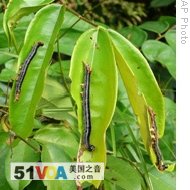Dakar
04 February 2009
 |
| Army worms feed on plant leaves in Pelelei in Bong County, Liberia, 16 Jan 2009 |
With more than half-a-million people affected by the infestation, Liberia was bracing for worse, fearing that caterpillars would burrow into the ground - where they would be safe from pesticides - and emerge as adult moths capable of flying 1,000 kilometers.
Pesticide will be used to prevent spread
But entomologists have now concluded that the invading caterpillars are not the so-called "army worms" that pupate underground but larvae of another moth species - Achaea catocaloides - that spin cocoons on the ground under fallen leaves and are thus easier to kill.
U.N. Food and Agriculture entomologist Winfred Hammond says now that the caterpillars are properly identified, Liberian and U.N. officials should quickly determine the extent of their infestation to properly choose the type and amount of pesticide needed to contain their spread.
While it is not as bad as it might have been, the infestation has closed schools and driven people from their homes in more than 100 villages.
Hammond says the caterpillars have already polluted most streams and fresh water wells.
"All along the waterways where the main host plant of this pest occurs, you find the water polluted," he said. "You have larvae that drops in the water or you have excreta or droppings from the larvae that goes into the water, polluting many of the waterways or the water bodies for the villagers."
Pests munch on cash crops
The caterpillars struck one of Liberia's richest agricultural regions near the border with Guinea and Sierra Leone. Hammond says they have decimated cash crops but should not have as large an impact on Liberia's food security as few of those crops are in the ground during the current dry season.
"Food crops at this time of the year are very scarce in the field," he said. "You do not have rice or cassava or any of the common food crops at the moment in the field. But you find them on cocoa on coffee on plantain on banana."
The caterpillars have already moved more than 25 kilometers into Guinea, eating crops and displacing farmers in half-a-dozen villages.
Sierra Leone has pre-positioned pesticides along the border and is asking civilians to notify authorities at the first sighting of black, hairy caterpillars.